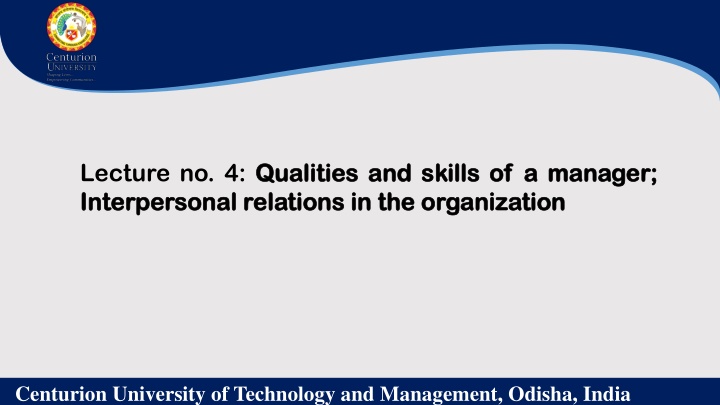
Key Qualities for Effective Interpersonal Relations in Organizations
Discover the essential qualities necessary for successful interpersonal relations in organizations according to American psychologist Robert Katz. Technical skills, conceptual skills, and human or interpersonal skills are crucial for managers. Effective communication, trust, empathy, and collaboration are emphasized for positive interpersonal relations within the workplace.
Download Presentation

Please find below an Image/Link to download the presentation.
The content on the website is provided AS IS for your information and personal use only. It may not be sold, licensed, or shared on other websites without obtaining consent from the author. If you encounter any issues during the download, it is possible that the publisher has removed the file from their server.
You are allowed to download the files provided on this website for personal or commercial use, subject to the condition that they are used lawfully. All files are the property of their respective owners.
The content on the website is provided AS IS for your information and personal use only. It may not be sold, licensed, or shared on other websites without obtaining consent from the author.
E N D
Presentation Transcript
Lecture no. 4: Qualities Interpersonal Interpersonal relations Qualities and relations in in the and skills skills of the organization organization of a a manager manager; ; Centurion University of Technology and Management, Odisha, India
According to American social and organizational psychologist Robert Katz, the three basic types of management skills include: 1. Technical Skills Technical skills involve skills that give the managers the ability and the knowledge to use a variety of techniques to achieve their objectives. These skills not only involve operating machines and software, production tools, and pieces of equipment but also the skills needed to boost sales, design different types of products and services, and market the services and the products. 2. Conceptual Skills These involve the skills managers present in terms of the knowledge and ability for abstract thinking and formulating ideas. The manager is able to see an entire concept, analyze and diagnose a problem, and find creative solutions. This helps the manager to effectively predict hurdles their department or the business as a whole may face. Centurion University of Technology and Management, Odisha, India
3. Human or Interpersonal Skills The human or the interpersonal skills are the skills that present the managers ability to interact, work or relate effectively with people. These skills enable the managers to make use of human potential in the company and motivate the employees for better results. Centurion University of Technology and Management, Odisha, India
Interpersonal relations in the organizations: Interpersonal relations play a crucial role in organizations as they shape the work environment, teamwork, and overall employee satisfaction. Positive interpersonal relations contribute to effective communication, collaboration, and a harmonious work culture. Here are some key aspects of interpersonal relations in organizations: 1. Communication:Effective interpersonal relations are built on open and transparent communication. Employees should be able to express their thoughts, ideas, and concerns freely, while also actively listening to others. Clear and respectful communication helps prevent misunderstandings, conflicts, and promotes a positive work environment. 2. Trust and Respect: Trust and respect are the foundation of strong interpersonal relations. Employees should trust and respect each other's abilities, opinions, and contributions. Centurion University of Technology and Management, Odisha, India
3. Empathy:Empathy involves understanding and sharing the feelings and perspectives of others. It plays a vital role in building strong interpersonal relations by creating a sense of connection and support. When employees feel understood and valued, it fosters a positive and inclusive work environment. 4. Collaboration: Interpersonal relations are essential for successful collaboration. Employees should be encouraged to work together, leverage each other's strengths, and contribute to shared objectives. Collaboration enhances creativity, problem-solving, and innovation within teams. Centurion University of Technology and Management, Odisha, India
5. Conflict Resolution: Conflicts are inevitable in any organization, but effective interpersonal relations can help in resolving them constructively. Employees should be equipped with conflict resolution skills, such as active listening, seeking common ground, and finding win-win solutions. A healthy approach to conflict fosters stronger relationships and enhances teamwork. 6. Team Building: Building strong interpersonal relations is vital for creating cohesive and high-performing teams. Managers should promote team-building activities and encourage regular interaction among team members. This helps foster camaraderie, trust, and collaboration among employees. Centurion University of Technology and Management, Odisha, India
7. Diversity and Inclusion: Interpersonal relations should be inclusive, respecting and valuing the diversity of employees. Organizations that foster an inclusive environment where diverse perspectives are welcomed and appreciated benefit from enhanced creativity, innovation, and problem-solving. 8. Recognition and Appreciation: Recognizing and appreciating the contributions and achievements of employees strengthens interpersonal relations. Simple gestures such as expressing gratitude, acknowledging accomplishments, and providing feedback go a long way in building positive relationships within the organization. Centurion University of Technology and Management, Odisha, India
9. Socialization: Informal interactions and socialization among employees can contribute to stronger interpersonal relations. Organizing team-building activities, social events, or even having dedicated spaces for employees to connect and share non-work-related conversations can help foster relationships and build rapport. 10. Leadership Role: Managers and leaders play a crucial role in fostering positive interpersonal relations. They should lead by example, promote open communication, and establish a culture of respect, trust, and collaboration. Effective leaders encourage employee engagement, provide support, and address conflicts promptly and constructively. Centurion University of Technology and Management, Odisha, India
